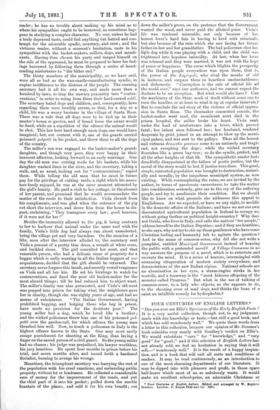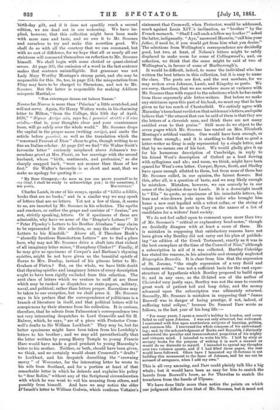FOUR CENTURIES OF ENGLISH LETTERS.*
"Din you ever see Ellis's Specimens of the Early English Poets It is a very useful collection, though not, to my judgment,- made with due knowledge or taste,—but still a good book, and which has sold wondrously well." We quote these words from a letter in this collection, because our opinion of Mr. Scoones's book coincides very nearly with Southey's verdict on Ellis's. We would substitute " care " for "knowledge," and "very good" for "good ;" and if this selection of English Letters has- not already sold, we feel no hesitation in saying that it will sell,—" wondrously well." It is the result of a happy inspira- tion, and is a book that will suit all sorts and conditions of readers. It may be read continuously, as an introduction.to• one of the most charming departments of our literature. It may be dipped into with pleasure and profit, in those spare half-hours which most of us so sedulously waste. It would make an excellent school-prize, an admirable Christmas or • Pour Centuries of Yhiglish Lotter*. Edited and arranged by W. Baptiste Sr-cones. London: C. Keg-an Paul and Co. 1880. birth-day gift, and if it does not speedily reach a second -edition, we are dead out in our reckoning. We have im- plied, however, that this collection might have been made -with more care and taste, and we owe it to Mr. Scoones and ourselves to try and make this assertion good. We shall do so with all the courtesy that we can command, but -with no sort of diffidence, for we hope that all or nearly all our strictures will commend themselves on reflection to Mr. Scoones himself. We shall begin with some clerical or quasi-clerical -errors. At page 205, the omission of a word in the last sentence makes that sentence unintelligible. But grammar was not Lady Mary Wortley liontagu's strong point, and she may be responsible for this_ So, too, in page 254, the misquotation from Pliny may have to be charged to Shenstone, and not to Mr. Scoones. But the latter is responsible for making Addison misquote Martial,— " Non caicumque datum est habere Nasam."
Nasam for Nasum is more than Priscian ' a little scratched, and will not serve. Again, Sir Henry Wotton wrote, in his charming letter to Milton, "from the College, this 10th day of April, 1638," "Signor Arrigo mio, says he, i pensieri stretti e ii viso sciolto,—that is, your thoughts close and your countenance loose, will go safely over the whole world." Mr. Scoones drops the capital in the proper name (writing arrigo), and omits the article before peusieri, as well as the translation which the ' renowned Provost of Eton" chose to give, though writing to so fine an Italian scholar. At page 240 we find" Sir Walter Scott's favourite letter" curiously misplaced above Johnson's tre- mendous growl at Mrs. Piozzi, on her marriage with the second husband, whose "birth, sentiments, and profession," so she sharply snapped back, "were not meaner than those of her first." Sir Walter's favourite is so short and neat, that we make no apology for quoting it :—
"My Dear Glengary,—As soon as you can prove yourself to be .my chief, I shall be ready to acknowledge yon ; in the meantime, I am yours, MACDONALD."
Charles Lamb, in one of his essays, speaks of "biblia a-biblia, books that are no books," and in a similar way we may speak of letters that are no letters. Yet not a few of them, it seems to us, are inserted by Mr. Scoones in his selection. The squibs and crackers, or rather the grape and canister of" Junius," are not, strictly speaking, letters. Or if specimens of these are -admissible, why have we none of the " Drapier's Letters ?" If "Peter Plymley's Letters to his Brother Abraham" may claim to be represented in this selection, so may the other "Peter's Letters to his Kinsfolk." Above all, if Theodore Hook's -" absurdly facetious Ramsbottom Letters" are to find a place „here, why may not Mr. Scoones drive a shaft into that richest of all imaginary letter mines, "Humphrey Clinker?" Finally, if he may give us specimens of Cowper's and Barham's rhyming -epistles, might he not have given us the beautiful epistle of Burns to Mrs. Dunlop, instead of his piteous letter to Mr. .Graham of Fintra ? But, on the whole, we have little doubt that rhyming epistles and imaginary letters of every description ought to have been rigidly excluded from this selection. The next class of letters which we venture to sniff at are those which may be ranked as dispatches or state-papers, military, naval, and political, rather than letters proper. Exceptions may be taken to our exception, but we shall press it. Mr. Scoones -says in his preface that the correspondence of politicians is a branch of literature in itself, and that political letters will be conspicuous by their absence from his collection. It is curious, therefore, that he selects from Palmerston's correspondence two not very interesting despatches to Lord Granville and Sir H. Bnlwer, which, he says, "are of a piece with Protector Crom- well's drafts to Sir William Lockhart." They may be, but far. better specimens might have been taken from his Lordship's letters to his brother ; and we may add parenthetically that the letter written by young Henry Temple to young Francis Hare would have made a good pendant to young Macaulay's letter to his mother. Neither, or both, should have been given, we think, and we certainly would shunt Cromwell's " drafts " to Lockhart, and his despatch describing the "crowning mercy " of Worcester, for the interesting letter he wrote to his wife from Scotland, and for a portion at least of that remarkable letter in which he defends and explains his policy -to "dear Robin," without any of the Scriptural circumlocution with which he was wont to veil his meaning from others, and possibly from himself. And here we may notice the elder D'Israeli's letter to William Godwin, which confirms Voltaire's
statement that Cromwell, when Protector, would be addressed, much against Louis XIV.'s inclination, as " brother " by the French monarch. "Shall I call such a fellow my brother ?" asked the latter, indignantly. "Aye," answered Mazarin, "call him your father, if need be, if you would get from him what you desire." The selections from Wellington's correspondence are decidedly good, but two, at least, of Nelson's letters might be safely displaced to make room for some of Collingwood's ; and, on reflection, we think that the same might be said of two of Wellington's, in favour of some of Marlborough's.
It would be difficult, indeed, to name the individual who has written the best letters in this collection, but it is easy to name the class. The poets are first, and the rest nowhere, for we may reckon even Johnson, Lamb, and Kingsley as poets. We are sorry, therefore, that we are nowhere more at variance with Mr. Scoones than with regard to the selections which he has made from these supremely able letter-writers. But before we make any strictures upon this part of his book, we must say that he has given us far too much of Chesterfield. We entirely agree with Macaulay's trenchant verdict on that nobleman's letters, and quite believe that "the utmost that can be said of them is that they are the letters of a cleverish man, and think there are not many entitled even to that praise." Still more do we object to the seven pages which Mr. Scoones has wasted on Mrs. Elizabeth Montagu's artifical vanities. One would have been enough, or more than enough ; and it is startling to find that so good a letter-writer as Gray is only represented by a single letter, and that by no means one of his best. We would gladly give it up for his humorous description of Cambridge, in reply to his friend West's description of Oxford as a land flowing with syllogisms and ale ; and room, we think, might have been spared for West's own letter. Cowper, Byron, Scott, and Shelley have space enough allotted to them, but from none of them has Mr. Scoones culled, in our opinion, the fairest flowers. But this, after all, is a question of taste, and we may likely enough be mistaken. Mistaken, however, we can scarcely be in our sense of the injustice done to Lamb. It is a downright insult to " Elia " to quote, as specimens of his inimitable letters, his lean and wire-drawn jests upou tho tailor who brought him home a new coat lapelled with a velvet collar, or the string of vapid puns which he sent to Cary on the names of a list of candidates for a widows' fund society.
We do not feel called upon to comment upon more than two of Mr. Scoones's "critical or explanatory head-notes," though we decidedly disagree with at least a score of them. He is mistaken in supposing that satisfactory reasons have not been given why Bentley did not carry out his plan of publish- ing "an edition of the Greek Testament, exactly as it was in the best exemplars at the time of the Council of Nice," although a subscription in aid of it was collected. Hartley Coleridge has stated the reasons, in his admirable and strangely neglected Biographia Borealis. It is clear from him that the expression of St. Jerome, "the single expression of a very florid and vehement writer," was not a sufficient basis for the vast super- structure of hypothesis which Bentley proposed to build upon
it; and in any case, as the ill-fated son of the author of Christobel very justly says, Bentley was not the man to execute great work of patient toil and long delay, and the money advanced upon the subscription was ultimately returned.
Secondly, Mr. Scoones is mistaken in supposing that "James Boswell was in danger of losing prestige, if not, indeed, of suffering total eclipse," because Dr. Samuel Parr wrote as follows, in the last year of his long life :—
" For many years, I spent.a month's holiday in London, and never failed to call upon Johnson. I was not only admitted, but welcomed. I conversed with him upon numberless suNects of learning, politics, and common life. I traversed the whole compass of his understand- ing; and, by the acknowledgment of Burke and Reynolds, I distinctly understood the peculiar and transcendental properties of his mighty and virtuous mind. I intended to write his life. I laid by sixty or seventy books for the purpose of writing it in such a manner as would do no discredit to myself. I intended to spread my thoughts over two volumes quarto, and if I had filled three pages, the rest would have followed. Often have I lamented my ill-fortune in not building this monument to the fame of Johnson, and let me not be accused of arrogance, when I add my own."
This is all very amusing, and Parr could plainly talk like a big whale ; but it would have been as easy for him to snatch the laurels from Boswell's brow, as for Thersites to snatch the truncheon from the hands of Ulysses.
We have done little more than notice the points on which our judgment differs from that of Mr. Scoones, but it must not
'be inferred from this that we leave his fascinating volume with any other feeling than that of gratitude to its editor. We shrink from expressing that feeling, but we do not shrink from saying *that we are convinced that Mr. Scoones has written a book which will charm and instruct more than one generation of delighted and grateful readers.




































 Previous page
Previous page